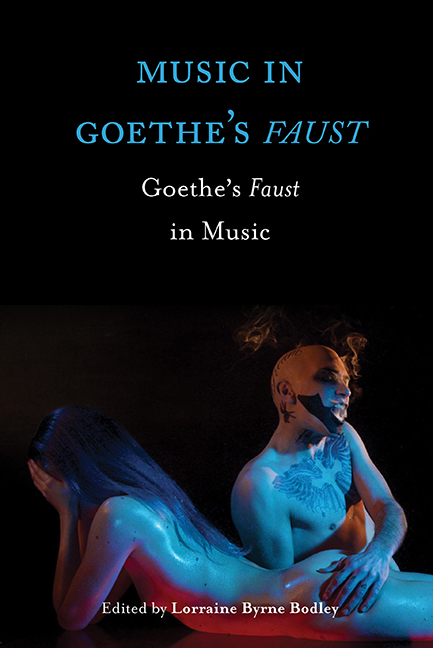Book contents
- Frontmatter
- Dedication
- Contents
- List of Illustrations
- Contributors
- Acknowledgements
- Abbreviations Used in the Notes
- Introduction. Rhapsody and Rebuke: Goethe's Faust in Music
- Part I Goethe's Faust: Content and Context
- 1 The Redress of Goethe's Faust in Music History
- 2 Wagering on Modernity: Goethe's Eighteenth-Century Faust
- 3 Reflectivity, Music and the Modern Condition: Thoughts on Goethe's Faust
- 4 Music and Metaphorical Thinking in Goethe's Faust: The Example of Harmony
- 5 Faust: The Instrumentalisation of an Icon
- Part II Legacies: Goethe's Faust in the Nineteenth Century
- Part III Topographies: Stagings and Critical Reception
- Part IV New Directions: Recent Productions and Appropriations
- Select Bibliography
- Index
3 - Reflectivity, Music and the Modern Condition: Thoughts on Goethe's Faust
from Part I - Goethe's Faust: Content and Context
Published online by Cambridge University Press: 30 August 2017
- Frontmatter
- Dedication
- Contents
- List of Illustrations
- Contributors
- Acknowledgements
- Abbreviations Used in the Notes
- Introduction. Rhapsody and Rebuke: Goethe's Faust in Music
- Part I Goethe's Faust: Content and Context
- 1 The Redress of Goethe's Faust in Music History
- 2 Wagering on Modernity: Goethe's Eighteenth-Century Faust
- 3 Reflectivity, Music and the Modern Condition: Thoughts on Goethe's Faust
- 4 Music and Metaphorical Thinking in Goethe's Faust: The Example of Harmony
- 5 Faust: The Instrumentalisation of an Icon
- Part II Legacies: Goethe's Faust in the Nineteenth Century
- Part III Topographies: Stagings and Critical Reception
- Part IV New Directions: Recent Productions and Appropriations
- Select Bibliography
- Index
Summary
For reasons that will be touched on in a moment, the relationship between the Faust figure and music has often been as intimate as it has been problematic. At the risk of seeming wayward, I want to begin by invoking not Goethe's Faust, but another treatment of the Faust legend – Thomas Mann's novel Doktor Faustus. I do so because Mann is as centrally concerned to understand the Faust/music nexus as is Goethe – and because there is an all-important difference between the two works. Mann's narrative of the life of the fictitious composer Adrian Leverkühn invites us time and again to reflect on both the ontology and the history of music. The ontological argument highlights the complex dialectic of music: it is both abstract and visceral. And the historical argument shows us music as deeply implicated in the broad currents and counter-currents of cultural and historical change in the first three decades of the twentieth century. In these terms, then, and in a great many others, Mann's Doktor Faustus is about music. But it is not – despite all its stunning coherence of structure and formal patterning – a work sustained by musicology. Whereas its greatest antecedent in the German tradition, Goethe's Faust, is precisely that.
In what sense, then, is Goethe's Faust a musical work? It is so in at least three ways. Firstly, it is a work that contains a great many musical numbers. Hans Joachim Kreutzer estimates that almost nineteen per cent of Part I and some twenty-four per cent of Part II are conceived as involving music in one form or another. And Tina Hartmann pushes the analogy with music even further, likening Part I to a Singspiel, and suggesting that the seemingly modern form of Part II, with its major scenic blocks, is best understood in the context of the fondness of early music theatre for masques, processions, and so on. Secondly, the musical sections that figure in the Faust text are integral rather than incidental; they are implicated in the very fabric of the work, which is, by that token, a musical drama rather than a drama with music.
- Type
- Chapter
- Information
- Music in Goethe's FaustGoethe's Faust in Music, pp. 61 - 72Publisher: Boydell & BrewerPrint publication year: 2017



